Key takeaways:
- Lyrics create emotional connections, allowing listeners to relate to personal experiences and memories.
- Crafting meaningful lyrics involves authenticity and creativity, often using imagery and storytelling to enhance impact.
- Lyrics serve as a reflection of cultural and societal issues, inspiring connection and sparking conversations for social change.
- Analyzing song lyrics can reveal deeper meanings and encourage personal introspection, providing empowerment and resilience.
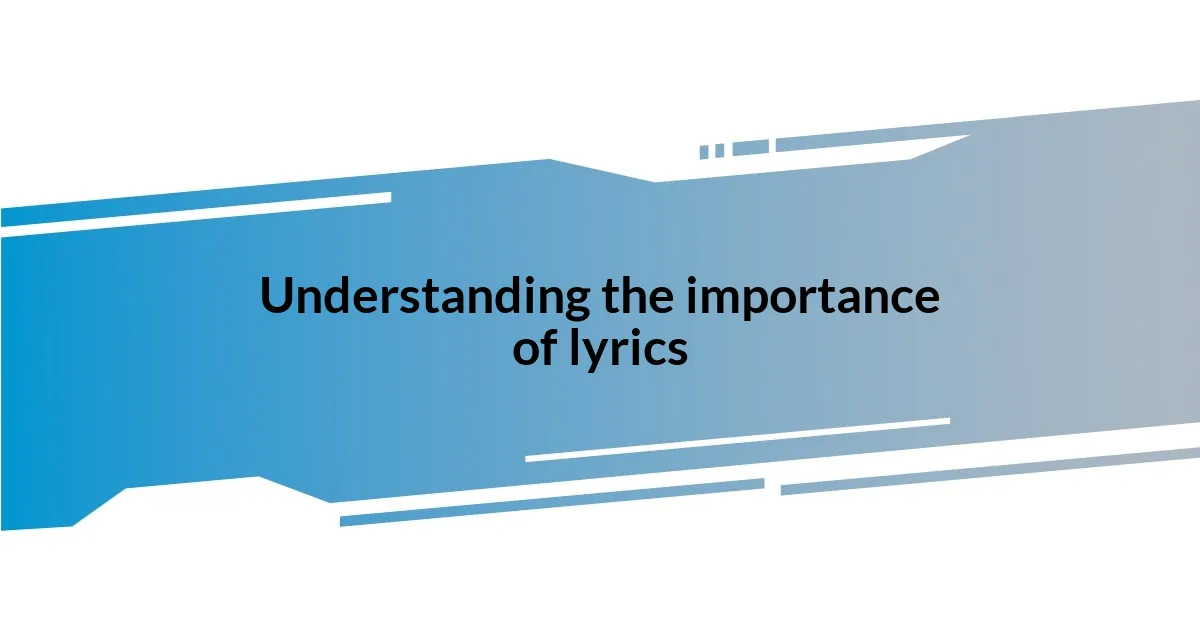
Understanding the importance of lyrics
Lyrics play a fundamental role in shaping our emotional connections to music. I vividly remember the first time I truly engaged with a song—Bob Dylan’s “Blowin’ in the Wind.” The power in those lyrics made me ponder the big questions in life. It led me to ask myself: how can words encapsulate such deep truths?
When I listen to music, I often find that lyrics can transport me back to certain moments or feelings. Take for example the lyrics of “Someone Like You” by Adele; they resonate with anyone who’s experienced heartbreak. It’s fascinating how a few carefully chosen words can evoke such powerful emotions and memories. Isn’t it remarkable how lyrics can stitch together our personal stories?
Furthermore, lyrics can serve as a catalyst for social change. For instance, the message behind “Formation” by Beyoncé challenged norms and sparked conversations about identity and race. It makes me wonder: how often do we overlook the weight that lyrics carry in reflecting societal issues? Understanding their importance unlocks a deeper appreciation for the music we love.
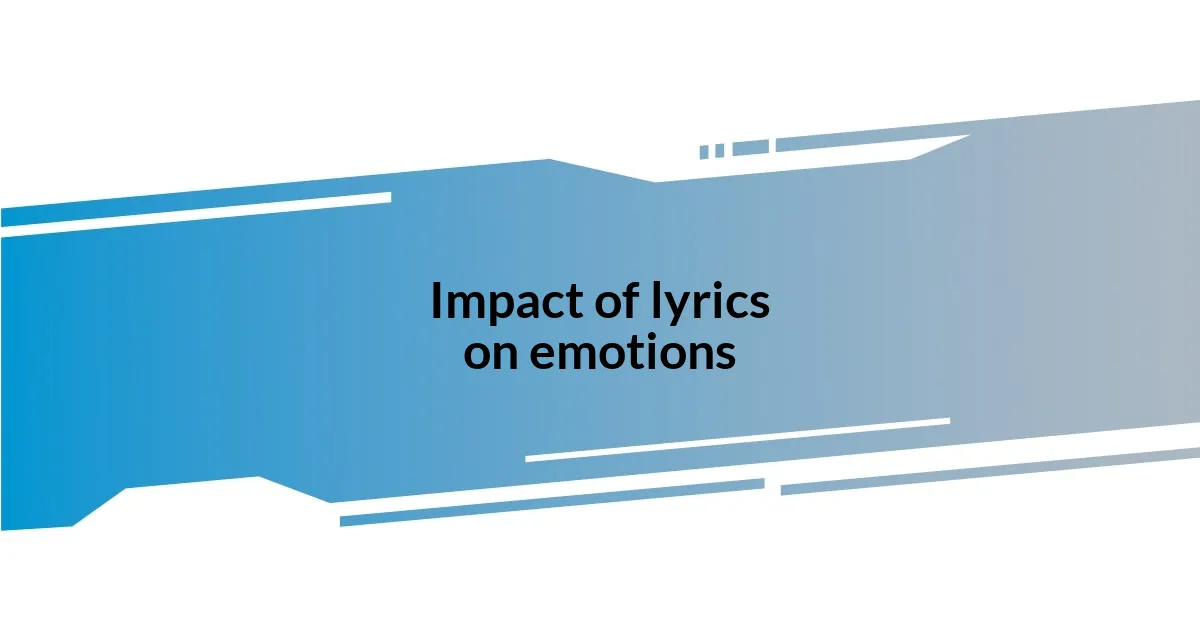
Impact of lyrics on emotions
When I listen to a song, I often feel like the lyrics reach into my soul, pulling out emotions I didn’t even know were there. There’s something incredibly moving about a well-crafted line that captures exactly what I’m feeling in the moment, almost like the artist is singing my own thoughts back to me. For example, in a particularly tough time in my life, “The Night We Met” by Lord Huron brought me to tears. The melancholy lyrics resonated so deeply, highlighting my own sense of loss while providing comfort in knowing I wasn’t alone in my feelings.
Consider how lyrics impact our emotions through these key points:
- Relatability: Lyrics often express feelings that many of us have experienced, forging a connection between the listener and the artist.
- Storytelling: A compelling narrative in a song can evoke nostalgia or empathy, allowing listeners to visualize and re-live memories.
- Mood Enhancement: Certain lyrics can uplift or intensify our current emotional state, reinforcing our feelings whether we want to dwell in them or seek solace.
- Catharsis: Singing along or even just hearing lyrics that mirror our struggles can serve as an emotional release, providing a sense of relief and understanding.
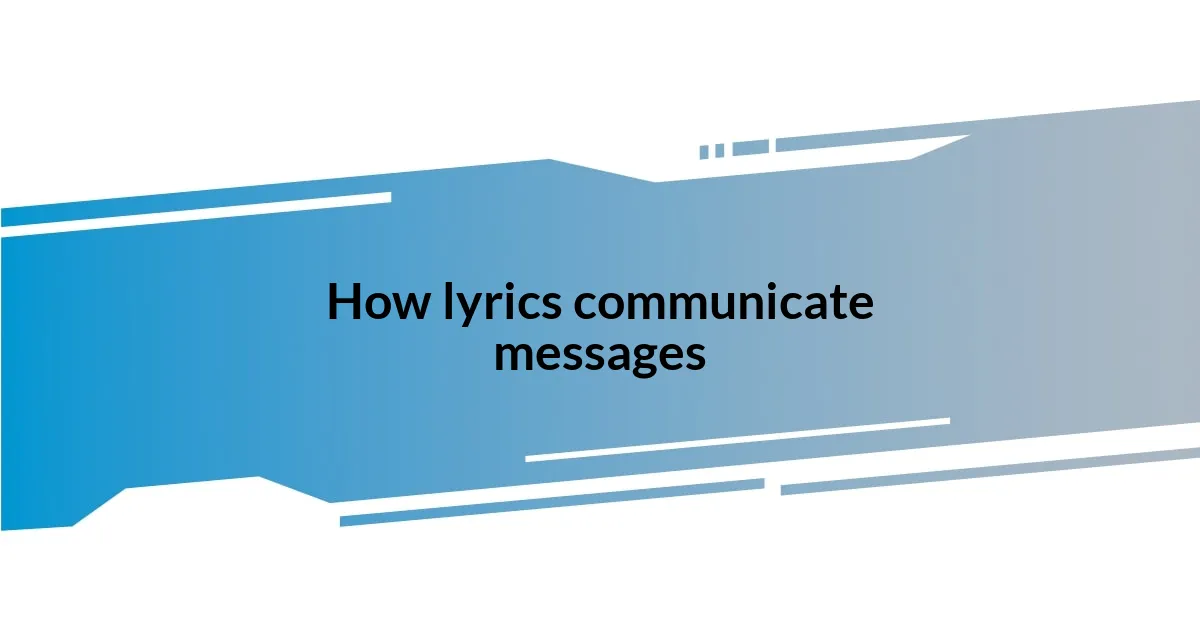
How lyrics communicate messages
When I reflect on how lyrics convey messages, I realize their power lies in the interplay of words, rhythm, and emotion. For example, when I hear “Imagine” by John Lennon, the simplicity of the lyrics paired with its melody creates a profound invitation to envision a better world. It’s almost as though the lyrics encourage listeners to dream collectively, sparking a desire for change.
Furthermore, lyrics often communicate complex ideas using metaphors or storytelling techniques. I find this particularly evident in the song “Fast Car” by Tracy Chapman, where the vivid imagery of escaping to a better life resonates deeply with listeners. It’s intriguing how a narrative woven into a song can challenge us to think critically about our own choices and aspirations.
Finally, the cultural context of lyrics can serve as a bridge between experiences and diverse audiences. Songs like “Fight the Power” by Public Enemy carry powerful messages about social justice. They remind me that lyrics not only reflect societal struggles but also galvanize listeners to take action, fostering a sense of community around shared values and experiences.
| Aspect | Explanation |
|---|---|
| Emotional Connection | Lyrics evoke feelings and memories, forging personal connections. |
| Metaphors and Imagery | Descriptive language and storytelling invite deeper engagement and reflection. |
| Cultural Context | Lyrics reflect societal issues, inspiring action and fostering community. |
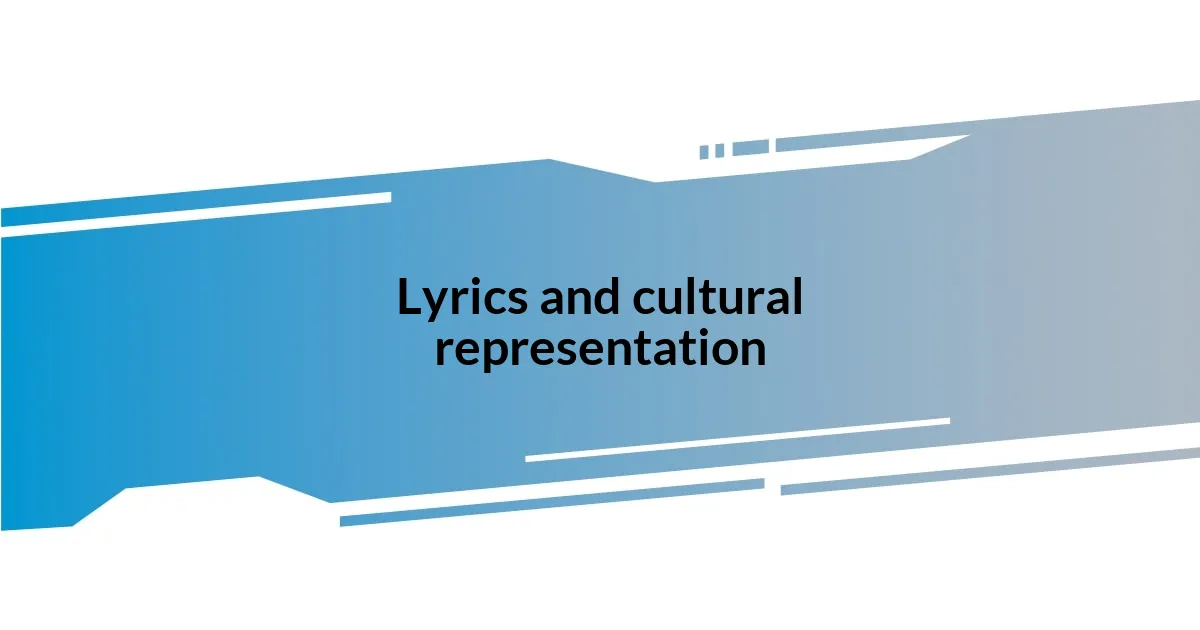
Lyrics and cultural representation
One of the most striking aspects of lyrics is their ability to represent and celebrate diverse cultures. I remember the first time I heard the powerful words of “La Bamba” by Ritchie Valens. The catchy rhythm coupled with lyrics in Spanish opened my eyes to the beauty of cultural expression in music. It made me ponder: how often do we overlook songs that reflect experiences outside our own?
I’ve found that lyrics serve as a mirror, reflecting the social issues and cultural nuances of a community. For instance, in songs like “Brown Skin Girl” by Beyoncé, the lyrics not only uplift but celebrate the unique beauty of women of color. It fills me with such pride to see these messages normalized in popular media. Can you imagine how impactful it is for someone to hear their identity embraced in a global context?
Moreover, it’s fascinating how certain lyrics can bridge gaps between different generations. In my own life, sharing songs from my youth with my children, like Bob Marley’s “One Love,” amazed me as they instantly connected to the messages of unity and respect. Their reaction reminded me that music is a universal language, and lyrical content can bring us together to explore shared experiences, enriching our understanding of each other’s cultures.
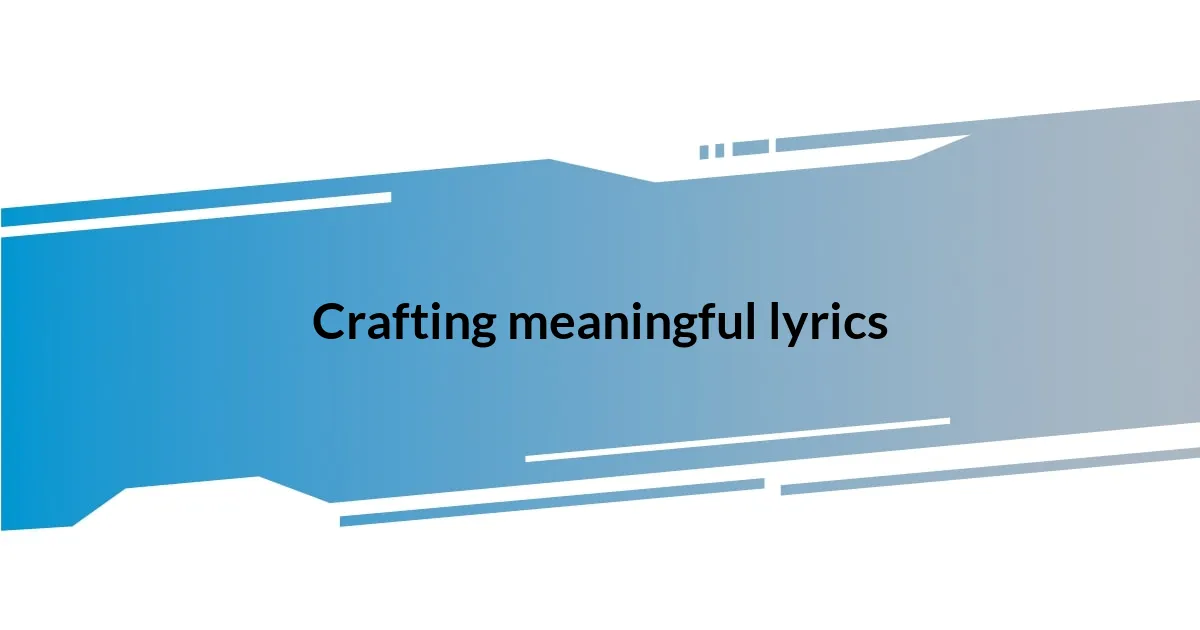
Crafting meaningful lyrics
Crafting meaningful lyrics is an art form that requires a delicate balance of authenticity and creativity. When I think back to my own songwriting attempts, I realize the moments that resonated most were when I drew from personal experiences. For instance, writing about a heartbreak I experienced allowed me to encapsulate a universal emotion. I found that vulnerability in lyrics connects deeply with listeners, as they often relate to those raw feelings.
Imagery plays a pivotal role in making lyrics impactful. I always ask myself, how can I paint a vivid picture with just a few words? When I listen to “Hallelujah” by Leonard Cohen, it strikes me how metaphors draw listeners into a narrative. The line about a broken hallelujah evokes such powerful imagery; I can almost visualize the struggle between despair and hope. It reminds me that great lyrics can transform mere words into an experience, inviting us to delve deeper into our own emotions.
Moreover, I believe that the cadence and rhythm of lyrics can enhance their meaning. Sometimes, I’ll catch myself humming a melody long after I’ve heard it, but it’s the lyrics that linger in my thoughts. I think of the song “Lose Yourself” by Eminem, with its relentless drive and urgency. The way he crafts words to match the beat creates a sense of immediacy that’s hard to shake. This fusion of sound and meaning highlights how thoughtful lyricism can make concepts truly unforgettable. Have you ever found yourself haunted by a line from a song? That’s the lasting impact of crafting meaningful lyrics.
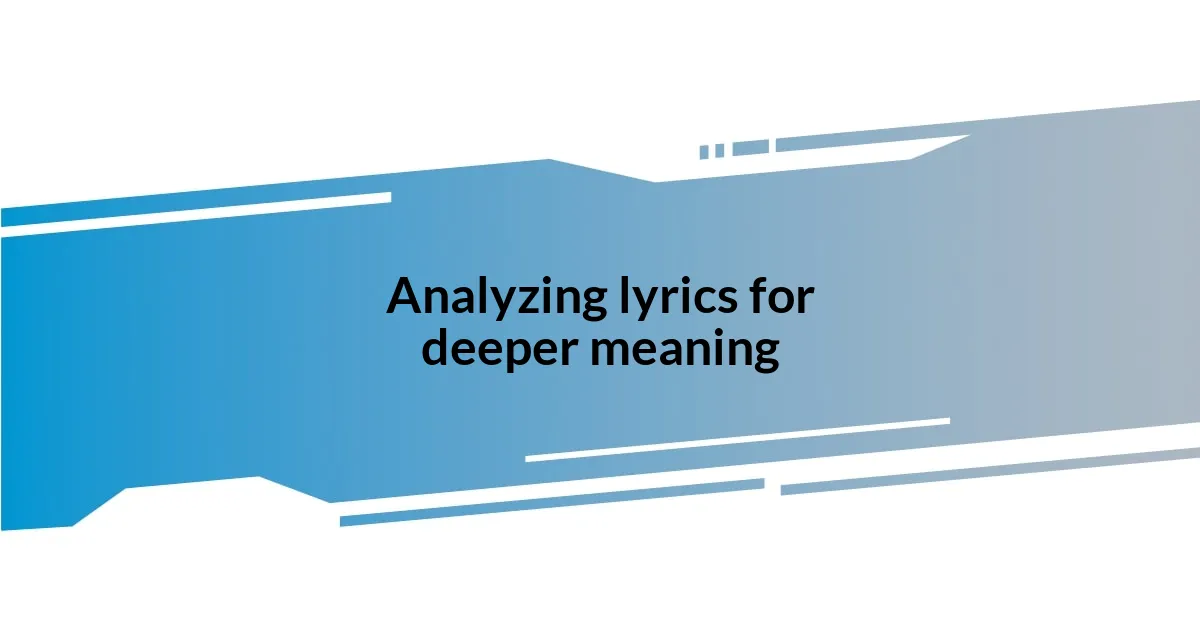
Analyzing lyrics for deeper meaning
To truly grasp the essence of a song, I find deep analysis of lyrics essential. I remember listening to “The Sound of Silence” by Simon & Garfunkel and being struck by its haunting portrayal of isolation. I asked myself, what do these lyrics reveal about our shared human experience? This level of contemplation allowed me to discover how profound simplicity can be when cleverly woven into a narrative.
Peering into the layers of lyrics often unveils hidden meanings. There’s a certain thrill in uncovering the intent behind a phrase, like when I explored the lyrics of “Fast Car” by Tracy Chapman. I was drawn in by her storytelling, which I found mirrored the struggles of many people seeking a change in their lives. I often wonder how many listeners resonate with that longing for freedom—this reflection made me appreciate the song on a much deeper level. Have you ever experienced that moment when a song feels like it was written just for you?
Analyzing lyrics also encourages introspection. I recall a time when I sat down with the lyrics of “Fight Song” by Rachel Platten, feeling overwhelmed by life’s challenges. As I dissected each line, it felt like the words became a mantra, pushing me towards resilience. It’s fascinating how lyric analysis can reveal not just the artist’s struggle but also offer guidance to listeners facing their own battles. Isn’t it remarkable how words can empower us, transforming our outlook in the process?
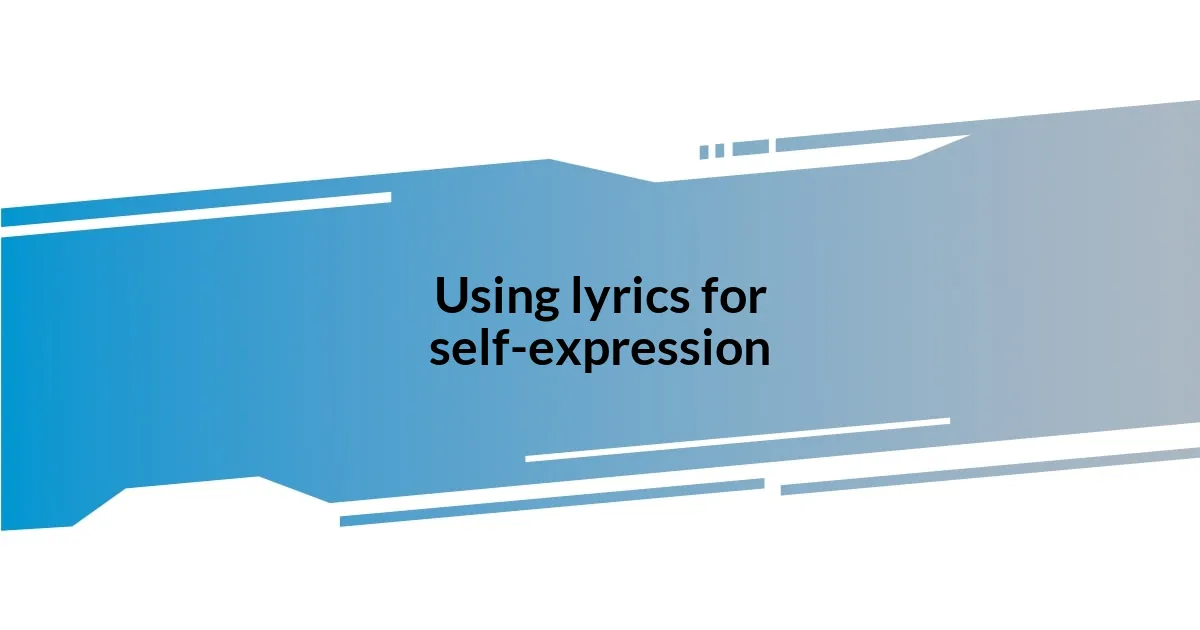
Using lyrics for self-expression
Using lyrics for self-expression has been a transformative experience for me. I remember writing a song after a particularly turbulent period in my life, pouring my heart into each line. It felt liberating to express emotions I often kept bottled up; the lyrics served as an outlet for my pain and confusion, allowing me to share my story in a way that felt safe and genuine. Have you ever found solace in putting your feelings into words?
There’s something uniquely powerful about crafting lyrics that speak to both personal and universal experiences. For instance, I once worked on a piece that explored feelings of inadequacy and self-doubt. As I molded the words, it struck me how they transcended my individual struggles, resonating with others who felt similarly. It’s a beautiful reminder that through vulnerability, we can touch the lives of those around us. Have you ever felt that connection when sharing your own thoughts and emotions through writing?
When I listen to artists who share their raw, unfiltered thoughts, like the poignant storytelling in “Praying” by Kesha, it makes me reflect on how effective lyrics can evoke deep empathy and understanding. I find myself moved not just by the beauty of her message, but by the way she channels her personal journey into something many can relate to. This kind of self-expression opens the door for healing—both for the artist and the listener. Isn’t it incredible how a few carefully chosen words can capture the essence of our human experience?